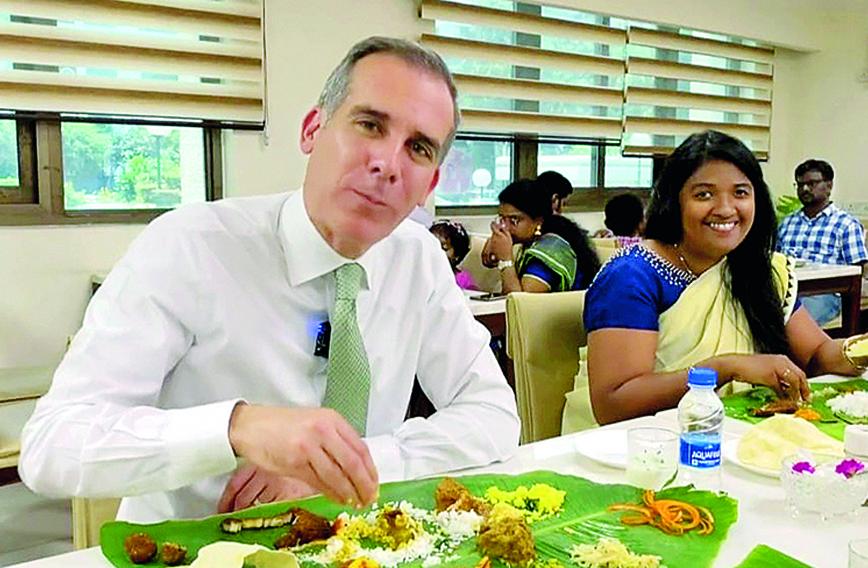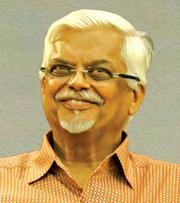

SANJAYA BARU
For over two years the United States political and administrative system found it difficult to appoint an ambassador to India. Finally, on the eve of Prime Minister Narendra Modi’s visit to the US, an ambassador landed in New Delhi and the President of India received his credentials quickly to allow him to hit the ground running, so to speak. Ambassador Eric Garcetti has already made waves with his new style of diplomacy, engaging civil society and business across the country. Gone are the days when US ambassadors were content to meet the movers and shakers of Lutyens’ Delhi. Garcetti has been to markets and restaurants, tweeting his way around.
When Harvard professor Robert Blackwill was appointed US ambassador to India, his format for engaging civil society representatives was to convene a seminar around a round table. The famous ‘Blackwill Round Tables’ became known for their vigorous academic exchanges, given that Blackwill was a professor and a diplomat. The late Vinod Mehta, Outlook magazine editor, walked out of one such round table because Blackwill was being more professorial than diplomatic, and asked him not to speak out of turn.
The present ambassador of Japan, Hiroshi Suzuki, has been as actively engaged with civil society as his US counterpart. He tweeted photographs of his wife and him devouring golgappas and dosas. A few years ago the ambassador of Mexico set protocol aside and drove around New Delhi in an auto rickshaw rather than a fancy car flying his country’s national flag. The spread of social media and the need to engage civil society lie behind this growing public engagement of diplomats.
I recall External Affairs Minister S. Jaishankar telling me that when he was posted to Beijing as India’s ambassador, he discovered he would be the first Indian plenipotentiary in the Middle Kingdom to socialize with Chinese business leaders. Till then Indian ambassadors only engaged with government officials, most often of equal rank. Diplomat turned politician Natwar Singh once famously said that when he joined the foreign service, diplomats walked the ‘high road’ of formal engagement with host government and fellow diplomats of equal rank, while it was left to the ‘lesser’ officers of the commercial service to engage host governments and local business on business and commerce. But, recalled Singh, by the time he became foreign minister he realized that even diplomats had to engage with business.
In fact, in India the diplomatic engagement with the business community began with Rajiv Gandhi’s government when business leaders accompanied the prime minister on important foreign visits. The idea being that business-to-business relations would be forged at the highest level of government. This went further after economic liberalization in 1991 and the opening up of the economy. Interestingly, Prime Minister P.V. Narasimha Rao’s first visit overseas was neither to an important neighbouring country, as has often been the practice, nor to a Big Power but was to the then economic powerhouse of Germany. All prime ministers since then have had business delegations joining them on foreign trips.
The civil society engagement of Indian diplomats overseas has also changed. I recall a former ambassador to Kuwait complaining to me that on his posting he had ceased to be a diplomat and had become a trade union leader-cum-labour relations manager since most of his time was devoted to attending to the problems of overseas Indian workers in that country. Today, however, Indian diplomats find themselves devoting as much time to the Indian diaspora as to the host government that they have been assigned to deal with. Often, a diplomat’s success in engaging the overseas Indian community overshadows any failure in representing Indian interests with the host government.
Not only has the Indian diaspora grown over the years, it is today among the largest worldwide. In the developed Anglosphere — US, UK, Canada, Australia, Singapore and the Gulf — it is also among the wealthier and better educated communities. What has, however, raised its profile is the fact that this diaspora’s social and political preferences are seen as shaping domestic politics in India. While all PMs have over the years interacted with the overseas Indian community, Prime Minister Modi has taken this to a new political level. It has, therefore, become necessary for other politicians too to engage the Indian diaspora with a view to domestic constituencies. This can only politicize the role of Indian diplomats overseas.
Another recent phenomenon in India linked to the spread of consulates in major cities is the rising profile of foreign diplomats in the social life of cities other than New Delhi. Consuls general in cities like Bengaluru, Chennai, Hyderabad, Kolkata and Mumbai are actively engaged in giving public lectures, funding seminars and engaging civil society in a variety of ways. This, too, is a new phenomenon. Several Indian universities and think tanks directly receive funding from the embassies, high commissions and consulates of various countries for seminars, conferences and research work. In the past, the promiscuity of such engagement would have raised many eyebrows but today it appears par for the course.
Such civil society engagement overseas has its benefits for retiring Indian diplomats. Many retired diplomats have been able to secure visiting professorships at institutions in countries they have served in. Some retired diplomats have been lobbyists for business groups, even defence industry lobbies. Of course, it is now commonplace for children of diplomats to not just secure overseas education but also employment and, eventually, citizenship. ν
Sanjaya Baru is a writer and Distinguished Fellow at the United Service Institution of India
Comments
Currently there are no Comments. Be first to write a comment!



